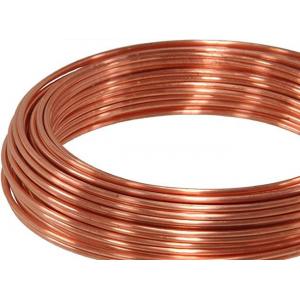Copper Wire Has Electrical Conductivity, Bright Surface,
Anti-Corrosion
Copper wire is an electrical conductor that is used in all kinds of electrical
applications. It can be found in homes, offices, factories, and
other industrial facilities. The conductor is made from either
single or multiple strands of pure copper that are insulated with
various materials such as polyvinyl chloride (PVC), polyethylene
(PE), polypropylene (PP), polyurethane (PUR), or
polytetrafluoroethylene (PTFE). This insulation protects against
short circuiting and the risk of an electrical fire caused by
arcing between wires in a circuit.
Copper is a soft metal that conducts electricity very well, which
makes it ideal for use in electrical projects. However, some copper
wire may also be made of copper alloys. The most common alloy for
electrical wires is tin-plated copper which features higher
corrosion resistance than pure, uncoated copper.
Copper wire has a high conductivity rating - about 90% of that of
silver - which makes it an ideal material for use in electronics.
Copper also has a low resistance compared to other metals like
aluminium or steel which makes it ideal for high-powered
applications like power lines and low-voltage wiring.
Copper Wire Types
Copper wire also comes in various types and sizes, so it’s helpful
to understand what kind will work best for your project. There are
many different types of copper wire available, including coated,
enamelled, tinned and uncoated solid copper. Each type has its own
advantages and disadvantages.
- Enamelled copper wire (ECW) has an enamel coating applied to it which makes it more
resistant to corrosion. Some types of coated copper such as
enamelled wire have an additional layer of insulation between the
outer coating and the conductor itself. Some enamelled wires may
also contain steel filaments inside them which provide increased
strength and flexibility. This type of wire is commonly used in
industrial applications where durability is key.
- Coated copper wire (CCW) has a coating applied to it that provides additional
properties such as increased corrosion resistance or reduced
oxidation during use. Coatings may include tin plating or phosphor
bronze plating. Copper wire can also be coated with plastic or
vinyl to make it more flexible. This allows it to withstand high
temperatures while still maintaining its electrical properties.
- Tinned copper wire (TCW) has a layer of tin plating applied to its surface which
protects against corrosion. Tinned copper wire is coated in a thin
layer of tin to prevent oxidation (the process by which oxygen
attaches itself to metal). This makes it easier to solder because
it prevents oxides from forming on the surface while soldering and
protects against corrosion once installed.
- Uncoated or bare copper wire does not have any protective coating on it and can oxidize easily
when exposed to air or water. This makes it typically unsuitable
for use outdoors or in environments where there is a high level of
moisture present.
Solid vs Stranded Copper Wire
There are two primary types of conductor - solid and stranded.
Solid Copper Wire
Solid copper wire is made from a single, solid piece of rigid
copper. It’s typically used in applications where the wire won’t be
bent or flexed frequently. It is also more durable and resistant to
corrosion than stranded copper wire.
Stranded Copper Wire
Stranded copper wire consists of multiple small strands of copper
that are twisted together to allow for increased flexibility.
Stranded copper wire is commonly used for AC power lines and
low-voltage power distribution systems.
Features of Copper wire.
- Excellent Electrical Conductivity: Copper is an excellent conductor
of electricity, second only to silver. It allows electric current
to flow with minimal resistance, resulting in efficient
transmission of electrical power.
- High Thermal Conductivity: Copper has excellent thermal
conductivity, meaning it can effectively dissipate heat generated
during the transmission of electrical current.
- Ductility and Flexibility: Copper wire is highly malleable and
ductile, allowing it to be easily shaped and bent without breaking.
- Corrosion Resistance: Copper has inherent corrosion resistance
properties, which help protect the wire from environmental factors
such as moisture and humidity.
- Compatibility: Copper wire is compatible with a wide range of
connectors, terminals, and other electrical components.
- Safety: Copper wire is considered safe for use in electrical
applications. It has a low risk of fire hazard and is less prone to
melting or degrading under high electrical loads.
Applications of Copper wire
- Electronics
- Automotive Industry
- Power Transmission
- Renewable Energy Systems
- Heating and Cooling Systems
- Electrical Wiring
- Telecommunications
- Appliances
Copper wire mesh.
Power transmission line.
Jewelry.


